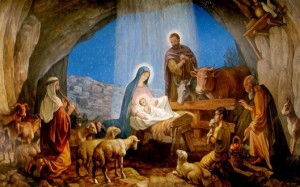celebrate Christmas on December 25th?
 Although the date of Christ’s birth is not given to us in Scripture, there is documented evidence that December 25 was of some significance to Christians as early as the beginning of the third century. One example can be found in the writings of Hyppolytus of Rome, who explains in the Chronicon, that Jesus was born nine months after the anniversary of Creation. According to his calculations, the world was created on the vernal equinox, March 25, which would mean Jesus was born nine months later, on December 25.
Although the date of Christ’s birth is not given to us in Scripture, there is documented evidence that December 25 was of some significance to Christians as early as the beginning of the third century. One example can be found in the writings of Hyppolytus of Rome, who explains in the Chronicon, that Jesus was born nine months after the anniversary of Creation. According to his calculations, the world was created on the vernal equinox, March 25, which would mean Jesus was born nine months later, on December 25.
Nineteenth-century liturgical scholar Louis Duchesne explains that “towards the end of the third century the custom of celebrating the birthday of Christ had spread throughout the whole Church, but that it was not observed everywhere on the same day” (Christian Worship, Its Origin and Evolution:… p. 260). His explanation was that the date of Christ’s birth was decided by using as a starting point the same day on which he was believed to have died.
In his book, Spirit of the Liturgy, Pope Benedict XVI states:
“The claim used to be made that December 25 developed in opposition to the Mithras myth, or as a Christian response to the cult of the unconquered sun promoted by Roman emperors in the third century in their efforts to establish a new imperial religion. However, these old theories can no longer be sustained. The decisive factor was the connection of creation and Cross, of creation and Christ’s conception (p. 105-107).”
Another possible reason December 25 may have been deemed suitable is its proximity to the winter solstice. After that date the days start to become longer, and thus it is at the beginning of a season of light entering the world (cf. John 1:5). The summer solstice—after which the days start to get shorter—falls near June 24, on which the Church celebrates the birth of John the Baptist, who declared of Christ, “He must increase, but I must decrease” (John 3:30).
CatholicAnswers.com
